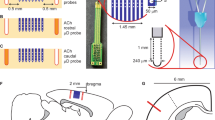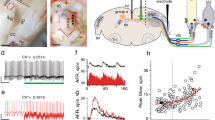Abstract
BY a direct chemical micro method the maximum choline esterase activity of the superior cervical ganglion of the cat has been measured and found to be, on the average, equivalent to the splitting of 0·10 γ of acetylcholine chloride per sec. per mgm. of fresh tissue. The full experimental details will be given in another publication.
This is a preview of subscription content, access via your institution
Access options
Subscribe to this journal
Receive 51 print issues and online access
$199.00 per year
only $3.90 per issue
Buy this article
- Purchase on Springer Link
- Instant access to full article PDF
Prices may be subject to local taxes which are calculated during checkout
Similar content being viewed by others
References
Brown, G. L., and Feldberg, W., J. Physiol., 88, 265 (1936).
Brown, G. L., J. Physiol., 81, 228 (1934).
Glick, D., Biochem. J., 31, 521 (1937). Compt. rend. Lab. Carlsberg, 21, No. 15 (1937).
von Brüke, F. Th., J. PJiysiol., 89, 429 (1937).
Dale, H. H., “The Harvey Lectures” (Williams and Wilkins Co., Baltimore, 1936–37).
Author information
Authors and Affiliations
Rights and permissions
About this article
Cite this article
GLICK, D. Choline Esterase Activity of Superior Cervical Ganglia. Nature 140, 426–427 (1937). https://doi.org/10.1038/140426c0
Issue Date:
DOI: https://doi.org/10.1038/140426c0
This article is cited by
-
Biochemical and histochemical observations on the postnatal development of cholinesterases in the sympathetic ganglion of the rat
The Histochemical Journal (1972)
-
Über die Biologische Inaktivierung Körpereigener Kreislaufaktiver Stoffe
Klinische Wochenschrift (1938)
Comments
By submitting a comment you agree to abide by our Terms and Community Guidelines. If you find something abusive or that does not comply with our terms or guidelines please flag it as inappropriate.



